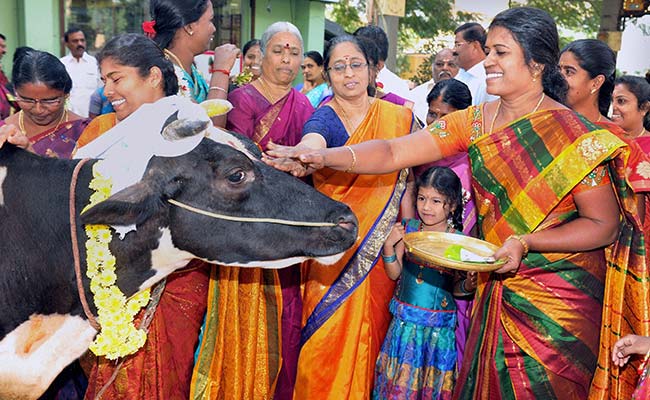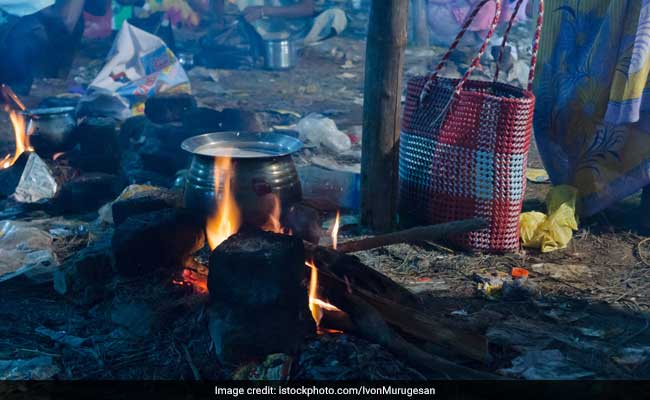
Pongal is here and with it the southern state of Tamil Nadu is bathed in festivities in celebration of one of the biggest Hindu festivals. Pongal is a popular harvest festivals of South India, mainly in Tamil Nadu. Celebrated in the auspicious month of 'Thai', the tenth month of the Tamil calendar which typically falls around January-February, the four-day long festival is also referred to as 'Thai Pongal' and is celebrated to mark the beginning of Uttarayan - the sun's transition northwards for a six-month period. Pongal 2018 will be celebrated from 14th to 17th January.
Pongal also coincides with the various harvest festivals celebrated across the country in different territories, with traditions unique to each region. Makar Sankranti in Maharashtra, Orissa and Bengal, Lohri in North India, Bhogali Bihu in Assam and Bhogi in Andhra Pradesh, all mark the shift in the season and earth's transition into the harvest season.
Celebrations of Pongal date more than 1000 years ago. Historians claim that the Chola empire would celebrate Puthiyeedu with much fervour. Puthiyeedu is believed to represent the first harvest of the year.
Thai Pongal gets its name from Tamil word Pongal which means "to boil". 'Ponga' literally means overflowing, with the abundance of rice, cereals, sugar-cane and turmeric that are harvested during the time. The tradition of new rice in pots until they overflow, is a popular tradition followed during Pongal. The ritual is symbolic of abundance and prosperity.
 Thai Pongal gets its name from Tamil word Pongal which means "to boil"
Thai Pongal gets its name from Tamil word Pongal which means "to boil"
Thai Pongal is a four-day long festival which is begins with Bhogi. On this day, people clean their houses, get rid of old household items and purchase new household items. This marks the start of a new cycle. The people assemble at dawn in Tamil Nadu to light a bonfire in order to burn the discards as a symbolic ritual. Some farmers keep medicinal herbs (neem, avram, sankranti) in northeast corner of each fields, to prevent crops from diseases and pests.
The second day and the main day is Thai Pongal. People start their day worshiping the sun god. The ritual of boiling till it overflows - a tradition that is the literal translation for Ponga is carried out early in the morning. When the milk starts to bubble and overflow out of the vessel, freshly harvested rice grains are added to the pot. Other people present in meanwhile, blow a conch called the sanggu and shout "Pongalo Pongal! Women decorate houses with kolam (designs) using rice flour and red clay.
On the third day, which is called Mattu Pongal, people organize their cattle, deck them up with accessories, decorative paints and worship them. Cattle plays a significant role in providing dairy product and fertilizers due to which they are revered immensely in the community. The last day of festivities is called Kaanum Pongal, where quality time is spent with family and friends. The word Kaanum means 'to visit'. The ritrual of Ponga is carried out early in the morning
The ritrual of Ponga is carried out early in the morning
Pongal recipes are made from all the fresh produce; dishes like sakkarai pongal, chakkara pongal, rava and khara pongal are relished with much delight during the harvest festival. A dominating feature of Pongal dishes is rice. Different variety of rice based dishes, be it sweet or savoury are consumed with much enthusiasm. Ven Pongal is made of rice mixed with moong daal, ghee, cashew nuts, raisins and mild spices. There's also a sweet version of pongal called Sakkarai pongal. It's made with jaggery. Pongal is cooked in clay pots, on stoves made with stones and wood is used as a fuel.
We wish you all a very Happy Pongal 2018 and Makar Sankranti!
Pongal also coincides with the various harvest festivals celebrated across the country in different territories, with traditions unique to each region. Makar Sankranti in Maharashtra, Orissa and Bengal, Lohri in North India, Bhogali Bihu in Assam and Bhogi in Andhra Pradesh, all mark the shift in the season and earth's transition into the harvest season.
Celebrations of Pongal date more than 1000 years ago. Historians claim that the Chola empire would celebrate Puthiyeedu with much fervour. Puthiyeedu is believed to represent the first harvest of the year.
Thai Pongal gets its name from Tamil word Pongal which means "to boil". 'Ponga' literally means overflowing, with the abundance of rice, cereals, sugar-cane and turmeric that are harvested during the time. The tradition of new rice in pots until they overflow, is a popular tradition followed during Pongal. The ritual is symbolic of abundance and prosperity.

Thai Pongal is a four-day long festival which is begins with Bhogi. On this day, people clean their houses, get rid of old household items and purchase new household items. This marks the start of a new cycle. The people assemble at dawn in Tamil Nadu to light a bonfire in order to burn the discards as a symbolic ritual. Some farmers keep medicinal herbs (neem, avram, sankranti) in northeast corner of each fields, to prevent crops from diseases and pests.
The second day and the main day is Thai Pongal. People start their day worshiping the sun god. The ritual of boiling till it overflows - a tradition that is the literal translation for Ponga is carried out early in the morning. When the milk starts to bubble and overflow out of the vessel, freshly harvested rice grains are added to the pot. Other people present in meanwhile, blow a conch called the sanggu and shout "Pongalo Pongal! Women decorate houses with kolam (designs) using rice flour and red clay.
On the third day, which is called Mattu Pongal, people organize their cattle, deck them up with accessories, decorative paints and worship them. Cattle plays a significant role in providing dairy product and fertilizers due to which they are revered immensely in the community. The last day of festivities is called Kaanum Pongal, where quality time is spent with family and friends. The word Kaanum means 'to visit'.

Pongal recipes are made from all the fresh produce; dishes like sakkarai pongal, chakkara pongal, rava and khara pongal are relished with much delight during the harvest festival. A dominating feature of Pongal dishes is rice. Different variety of rice based dishes, be it sweet or savoury are consumed with much enthusiasm. Ven Pongal is made of rice mixed with moong daal, ghee, cashew nuts, raisins and mild spices. There's also a sweet version of pongal called Sakkarai pongal. It's made with jaggery. Pongal is cooked in clay pots, on stoves made with stones and wood is used as a fuel.
We wish you all a very Happy Pongal 2018 and Makar Sankranti!

